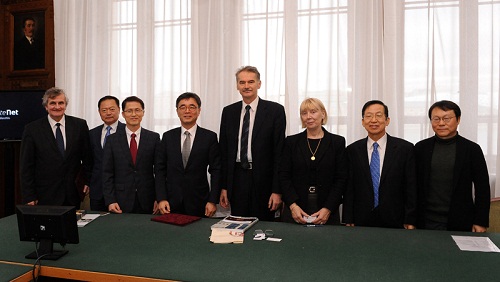policy
KAIST and the Budapest University of Technology and Economics in Hungary extended their existing agreement for comprehensive cooperation in education and research, and signed a new memorandum of understanding (MOU) for student exchanges on October 19, 2016, at Budapest University.
The two universities will exchange faculty, researchers, and students for education and research collaboration, implement dual degree programs, conduct joint lectures and research projects, and share infrastructures and talent pools.
These agreements were part of the agenda for the 8th Meeting of the Korea and Hungary Science and Technology Joint Committee, which took place October 17-19, 2016, in Budapest.
President Sung-Mo Kang of KAIST, Associate Vice President Sung-Hyon Myaeng of the International Office, and Director General Won-Ho Choi of International Relations at the Ministry of Science, ICT and Future Planning of Korea were present at the MOU singing.
Associate Vice President Myaeng said:
“Traditionally, the Budapest University of Technology and Economics has been known for its strong base in the natural sciences. Combining this with KAIST’s excellence in engineering, the two universities will bring synergistic effects that will help further develop the schools as well as their host nations.”
“Finding partners to implement joint research projects sponsored by the European Union or establishing cooperative networks among future talents between the two countries through various student exchange programs can be a good starting point,” he added.
The Budapest University of Technology and Economics was created in 1782, and is one of the most prestigious universities in Hungary, having produced three Nobel Prize laureates. It has a highly-globalized campus, where one third of its student population is made up of international students, and offers lectures and research in English.
In addition, the Hungarian-Korean Technical Cooperation Center Foundation, established in 1992 and based in Budapest, hosted a seminar on science in Korea and Hungary on October 17, 2016. At the seminar, Korean and Hungarian participants discussed issues on the two nations’ science, technology, and strategies to drive innovation under the topic “The Technical Innovation-Importance of Startup Companies.”

Associate Vice President Sung-Hyon Myaeng of the International Office, KAIST, is pictured fourth from the left, and János Józsa, rector of the Budapest University of Technology and Economics, is fifth from the left.
-
people KAISTian of the Year 2016: Professor Hee-Sung Park
Professor Hee-Sung Park of the Department of Chemistry has been named the KAISTian of 2016. President Sung-Mo Kang awarded him at the New Year ceremony on January 2, 2017. The KAISTian of the Year recognizes the most outstanding professor whose research and scholarship made significant achievements for the year. The Selection Committee announced that Professor Park was chosen as the 16th awardee in recognition of his developing new methods to incorporate unnatural amino acids into proteins.
2017-01-10 -
event KAIST Operates a Summer School with Imperial College London
KAIST and Imperial College London jointly hosted a summer school on the KAIST campus on July 14-17, 2015. Twenty-five students from both universities, 11 from KAIST and 14 from Imperial College, participated in the summer program. KAIST and Imperial College agreed to hold academic and research exchange programs in 2013; this year’s summer school represented the first effort. Participants were divided into a few cohorts of four or five students. They conducted a series of activities to im
2015-07-29 -
event KAIST International Food Festival
The KAIST International Students Association (KISA) hosted the 2015 International Food Festival in front of Creative Learning Building, KAIST, on May 22, 2015. This was the 11th International Food Festival for KAIST where international students introduced food from their home countries to strengthen cultural exchanges with Korean students. This year’s festival was the biggest international festival in Daejeon in which around 500 students and staff from KAIST, Chungnam National Universi
2015-05-27 -
policy KAIST Signs MOU with Jeonju City
KAIST signed a memorandum of understanding for the development of new industries based on convergence technology with the government of Jeonju City on February 26, 2015. Located in the south west portion of the Korean peninsula, Jeonju City is home to a rich historical and cultural heritage. Taking advantage of its proximity to the university's campus, the city will cooperate with KAIST to develop the local economy through creating new industries and jobs. To that end, KAIST and Jeonju will
2015-02-26